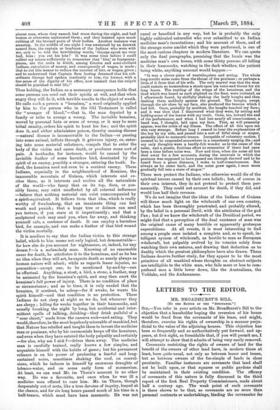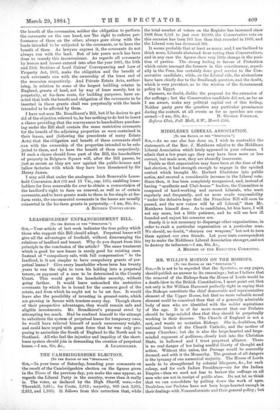LETTERS TO THE EDITOR.
MR. BROADHURST'S BILL.
(TO THE EDITOR OP THE " SPECTATOR:1
SIE,—YOU refer in your article on Mr. Broadhurst's Bill to the objection that a leaseholder buying the reversion of his house would be freed from the covenants of his lease, and might, therefore, exercise his rights of ownership in a manner preju- dicial to the value of the adjoining houses. This objection has been so frequently and so authoritatively put forward, and ap- pears, at first sight, so formidable that, if you will permit me, I will attempt to show that it admits of being very easily removed.
Covenants restricting the rights of owners of land for the benefit of the owners of other land have, in modern times at least, been quite usual, not only as between lessor and lessee, but as between owners of the fee-simple of lands in close proximity. Familiar instances are covenants that land shall not be built upon, or that squares or public gardens shall be maintained in their existing condition. The efficacy of covenants of this nature is fully discussed in the third report of the first Real Property Commissioners, made about half a century ago. The weak point of such covenants is there shown to be that, as covenants are no more than personal contracts or undertakings, binding the covenantor for the benefit of the covenantee, neither the obligation to perform the covenants on the one hand, nor Ile right to enforce per- formance of them on the other, always goes along with the lands intended to be subjected to the covenants, or to have the benefit of them. As lawyers express it, the covenants do not always run with the land. But of late years much has been done to remedy this inconvenience. As regards all covenants by lessors and lessees entered into after the year 1881, the 10th and 11th Sections of Lord Cairns' Conveyancing and Law of Property Act, 1881, make the obligation and the benefit of such covenants run with the ownership of the lease and of the reversion respectively. And Private Estate Acts, author- ising, in relation to some of the largest building estates in England, grants of land, not by way of lease merely, but in perpetuity, at fee-farm rents, for building purposes, have en- acted that both the benefit and obligation of the covenants to be inserted in these grants shall ran perpetually with the lands intended to be affected by them.
I have not seen Mr. Broadhurst's Bill, but if he desires to get rid of the objection referred to, he has nothing to do but to insert a clause providing that the conveyances to leaseholders purchas- ing under the Bill shall contain the same restrictive covenants -for the benefit of the adjoining properties as were contained in their leases, and (following the precedents of many Estate Acts) that the obligation and benefit of these covenants shall a-un with the ownership of the properties intended to be sub- jected to them, and, to have the benefit of them respectively. If such a clause should form part of the Bill, the leaseholders of property in Belgrave Square will, after the Bill passes, be just as secure as they are now against the public-houses and tallow factories with which they have been threatened by Sir Henry James.
I may add that under the analogous Irish Renewable Lease- hold Conversion Act (12 and 13 Vic., cap. 105), enabling lease- holders for lives renewable for ever to obtain a commutation of the landlord's right to fines on renewal, as well as of certain covenants, and to have grants made to them in fee-simple at fee- -farm rents, the uncommuted covenants in the leases are usually reinserted in the fee-farm grants in perpetuity.—I am, Sir, &c.,
A RETIRED CONVEYANCER.



































 Previous page
Previous page